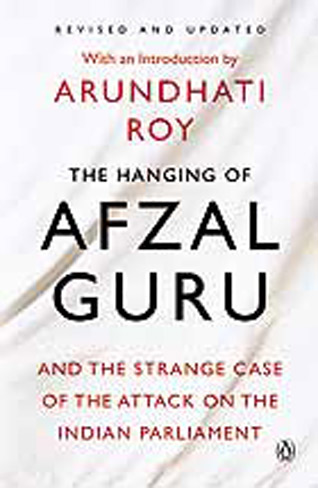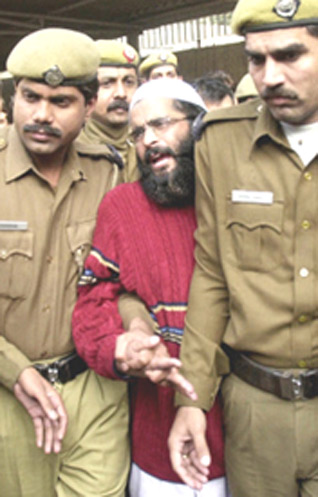Books
Offered, In Anger:
India and The Hanging of Afzal Guru
ARUNDHATI ROY
After spending 11 years in prison in New Delhi, most of them in solitary confinement, and on death row, on a clear February morning, Mohammed Afzal Guru was hanged.
It was an execution performed in stealth, and as a former Solicitor General of India (and senior advocate in the Supreme Court) says later in this book, an act whose legality was gravely questionable.
How could there be legal doubts about an elected government hanging a man who had been given three life sentences and a double death sentence by the highest court in the land?
Because only 10 months before, in April 2012, the Supreme Court had concluded a series of hearings over the question of executing prisoners who had already served inordinately long prison sentences. One of the cases in that cluster was the case of Afzal Guru. The bench had reserved its judgement; but Afzal Guru was executed before the court delivered its verdict.
The government turned down his family’s request for his body. He was buried without ceremony next to Maqbool Bhat, the founder of the Jammu Kashmir Liberation Front and the pre-eminent icon of Kashmir’s movement for azadi, freedom.
And so, in the compound of Tihar Jail, a second Kashmiri body awaits a funeral. While in Kashmir’s Mazar-e-Shuhada, Martyr’s Graveyard, another empty grave awaits a body. Those who know Kashmir know how those imagined, subterranean, human-shaped hollows have, in the past, unleashed militant insurrections.
In India, once the initial bout of noisy celebrations trumpeting the triumph of the ‘Rule of Law’ had subsided, once the goons on the streets had run out of sweets to distribute (how long can you keep burning posters of a dead man without snack breaks?), a few people were permitted to express their unease with capital punishment, and to air their doubts about whether or not Afzal Guru had a fair trial. That was nice. And well-timed too. Once again we came across as a Democracy with a Conscience.
Except that debate too has already taken place, six years ago, and even then it was four years overdue. First published in December 2006, the essays in Part I of this book deal at length with the trial, the miscarriage of justice, the fact that Afzal Guru went unrepresented in the trial court, the ways in which real leads were never followed, and the insidious role of the media at the time. Part II of this new edition is a compilation of essays and analyses written after the February 9 execution. The introduction to the first edition ends by saying “therefore this book, offered in hope”. This time, it is offered in anger.
In these very vengeful times, the impatient may well have only enough time to say: Chuck the details and the legal minutiae. Was he guilty or was he not? Did the Indian government hang an innocent man?
Anyone who takes the trouble to read this book would have to come to the conclusion that Afzal Guru had not been proven guilty of the crime he was accused of committing—of being one of the conspirators in the attack on the Indian Parliament or, more fashionably, the Attack on Indian Democracy. (Contrary to the elaborate misinformation put out in the media, even the prosecution never accused him of being one of the attackers, or of killing anybody. He was only tried for being an accomplice, a mere footsoldier.) Even as the Supreme Court convicted him of this crime and sentenced him to death, in its controversial judgement that invoked satisfying “the collective conscience of society” as one of its reasons for putting a man to death, it also went out of its way to say that the evidence before it was not direct, but only circumstantial.
Terrorism experts and other analysts have loftily glossed over this by saying that in cases like these the “full truth” would always be elusive. In the case of the attack on Parliament, this certainly seems to be what has happened. The “truth” seems to have eluded us entirely. Logically, that should have raised the juridical principle of “reasonable doubt”. It did not. A man whose guilt was by no means established beyond reasonable doubt was hanged.
Let’s concede that an attack on Indian Parliament does amount to an attack on democracy. Was the 1983 Nellie massacre of three thousand “illegal Bangladeshis” not an attack on Indian democracy?
Or the massacre of more than three thousand Sikhs on the streets of Delhi in 1984?
Was the demolition of the Babri Masjid in 1992 not an attack on Indian democracy?
Was the Shiv Sena-led slaughter of thousands of Muslims in Mumbai in 1992-93 not an attack on Indian democracy?
What about the 2002 pogrom against thousands of Muslims in Gujarat?
There is plenty of evidence, direct as well as circumstantial, to connect leaders of our major political parties to these mass murders. But could we ever imagine any of them being arrested, imprisoned for 11 years, let alone executed? Oh no. On the contrary, one of them -- who had never held public office -- was recently given a state funeral that brought the city of Mumbai to a standstill. Another will most likely be running for the post of prime minister of the world’s largest democracy in the next election.
In this cold, cowardly way, making empty, exaggerated gestures that mimic due process, India’s own brand of fascism has laid itself upon us.
In the Mazar-e-Shuhada in Srinagar, the epitaph on Afzal’s tombstone (which the police removed, and then was forced to replace because of public outrage) reads, in translation: “The martyr of the nation, Shaheed Mohammed Afzal Guru, Date of Martyrdom: 9th February 2013 Saturday, whose mortal remains are lying in the custody of the Government of India. The nation is awaiting its return.”
Knowing what we do, it would be hard to describe Afzal Guru as a warrior in any conventional sense of the word. His shahadat, his martyrdom, comes from having experienced and borne witness to the hell that tens of thousands of ordinary young Kashmiris have lived through.
Like them, he has been burned, beaten, electrocuted, blackmailed and now killed. (You can read a description of what was done to him on one occasion, in the picturesque words of his torturer, in Appendix iii).
But while Afzal Guru was executed in the greatest secrecy, the events that led to his execution were performed on stage to a full house. When the curtains went down and the lights came up, the audience applauded. The reviews were mixed, but what the hell, the deed had been done.
The “full truth” is that Afzal Guru is dead and that we will probably never know who attacked Indian Parliament. The Bharatiya Janata Party has been robbed of its grisly election ditty: “Desh abhi sharminda hai, Afzal abhi bhi zinda hai (the nation is still in shame, Afzal is still alive).” It will have to come up with a new one.
Long before he was arrested and jailed, Afzal Guru was a broken man. Now that he is dead, those who would prey on carrion are circling over his body, trying to gain political traction, and to contain, coopt and manage people’s fury. For some time to come, we will be presented with letters he never wrote, books he never authored and things he never said. These ugly games will not change anything. Because of the way he lived and the way he died, he will live on in popular Kashmiri memory, as a hero, lying side by side with Maqbool Bhat, and sharing his aura.
As for the rest of us, his story makes it clear that the real attack on Indian Democracy is the continued military occupation of Kashmir.
Afzal Guru, Rest in Peace.
[Courtesy: Outlook India]
March 16, 2013
Conversation about this article
1: Kulwant Singh (U.S.A.), March 16, 2013, 8:37 AM.
A government which keeps prisoners for multiple life sentences, before executing them, is a vindictive and childish one. A government that promotes the torture of its prisoners over decades, is a sadistic one. Even the Nazis treated their enemies better than India treats its prisoners. Is it a coincidence then that Hitler's "Mein Kampf" is a best seller in India?
2: Baljit Singh Pelia (Los Angeles, California, U.S.A.), March 16, 2013, 1:13 PM.
This act truly reflects the collective mind-set of the fundamentalists that have, through their strangle-hold, forcibly held together a nation being run by goondas. That the people feel so helpless in rising up against this tyranny is truly bothersome.
3: Gurteg Singh (New York, USA), March 17, 2013, 12:26 PM.
In a diabolical move, the Hindu-Indian government has now moved Bhai Jagtar Singh Hawara to the death row cell occupied by Afzal Guru before he was executed.
4: N Singh (Canada), March 19, 2013, 1:46 PM.
@#3: I am very upset at this. I really think this country is a hell hole. It is worse than the Moghul era ever was. These people are barbarians.
5: Jagjit Singh (Hong Kong), March 20, 2013, 5:21 AM.
I think we Sikhs made the mistake of replacing the Mughals and the British with this bunch of hooligans. How many more mistakes do we have to commit before ...?




